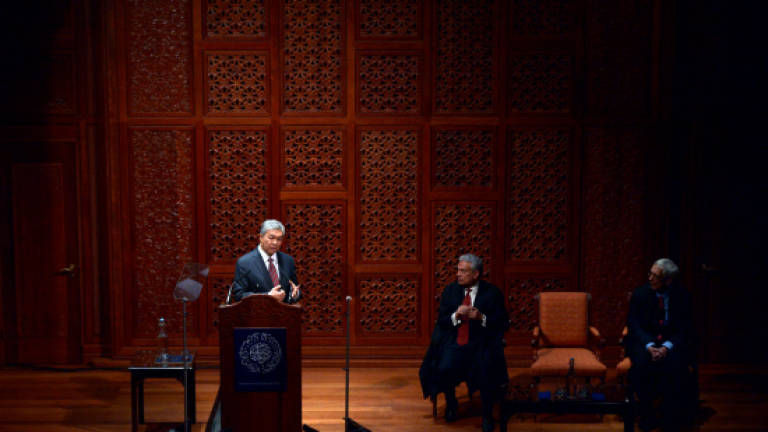Misplaced secular interests, tribalism also motivate extremism, radicalism and terrorism: Zahid

OXFORD: Datuk Seri Dr Ahmad Zahid Hamidi said extremism, radicalism and terrorism are not only motivated by misguided religious orientation but also by misplaced secular, tribal and other human interests and affiliations.
The Malaysian Deputy Prime Minister said the world community shouldered the responsibility to de-root all elements of these negative trends by addressing both the internal and external factors which contributed to the problem in a concurrent manner with all seriousness.
"Extremism, radicalism and especially terrorism have always been condemned in traditional Islamic teachings and practices. However, the responsibility for the misguided doctrines and horrendous actions of a very small minority should never be placed on the shoulders of the innocent majority.
"Such action not only is an injustice but would also imply a form of extremism, and in some cases even terrorism," he said in his keynote address entitled "De-Rooting Radicalism and Extremism" at the Oxford Centre for Islamic Studies (OCIS), Oxford University, here Wednesday. The lecture was attended by scholars and other guests.
Ahmad Zahid, who is also Home Minister, said the injustice would unintentionally become useful fodder for real extremists and terrorists to justify their mistrust in majority opinions, international laws and conventions, and to recruit new members worldwide.
Ahmad Zahid, who is on a five-day working visit to the United Kingdom from Monday, said there were many inter-related factors that led to extremism, radicalism, wars and terrorism.
In a globalised world, he said, radicalism and extremism and their impact on international relations and security were not only limited to Muslims but also to those who profess other religions and secular ideologies, but these have been justified often times wrongly, in the names of religion, ideology, King, Country, ethnic and linguistic purity, or even Humanity.
Giving some of the examples to prove his point on the causes of radicalism, Ahmad Zahid said the First and the Second World Wars, and the Korean and Vietnam Wars could be attributed primarily to ideological causes while the Balkan Tragedy was essentially based on ethnic-religious ground.
The mass genocide in the Christian majority state of Rwanda, he said was largely motivated by tribalism; the Ugandan civil war was primarily due to Christian religious radicalism, the mass killings of the Muslims in the Ivory Coast were ethnic-religious, committed by Christian and indigenous groups.
However, the world was now focusing on de-rooting Muslim extremism, radicalism, and terrorism and these phenomena have victimised not only those who were directly targeted, but also Muslims worldwide and stoked the lingering ambers of Islamophobia, he added.
The Deputy Prime Minister said de-rooting extremism, radicalism, and terrorism among a small minority of Muslims involved a keen and correct understanding of their real internal and external causes, and the application of wise, bold, and consistent multi-dimensional corrective, punitive, and preventive approaches
Sharing Malaysia's experience in de-rooting radicalism, extremism and terrorism, Ahmad Zahid said Malaysia uses a three-pronged and mutually interconnected approach, namely educational and re-traditionalisation; legal and de-radicalisation; and social and economic approach.
Ahmad Zahid said Malaysia's current system of education, from the lowest to the highest levels, has been relatively successful in creating educated, religious-ethical, skilled, united and multi-cultured citizens.
However, the government continues to strengthen the positive features of the education system, review, and correct any shortcomings and defects, and adds new features to deal with emergent and future challenges, he said.
At the same time, the Malaysian education system must also be re-traditionalised through the strengthening of the traditional worldview of Islam as agreed upon by the largest majority of authoritative traditional scholars in various fields of Islamic thought and culture, he said.
On the legal front, he said, Malaysia had introduced related legislation, namely the Prevention of Crime Act 2015 (POTA) and the Special Measures against Terrorism in Foreign Countries Act 2015 (SMATA), which were consistent with the spirit and purpose of the UN Security Council Resolution (UNSCR) 2178 particularly in monitoring and regulating Foreign Terrorist Fighters (FTFs).
Ahmad Zahid said Malaysia also continues to work closely with other countries and international organisations in improving border security to prevent movement of terrorists.
The de-radicalisation efforts in Malaysia, he said, uses the approach of strategic collaboration between the Government, civil societies including the private sector, so as to prevent individuals or groups of individuals from engaging in extremist and radical activities at home or abroad.
"To consistently and successfully de-root extremism, radicalism, and terrorism in all shapes and forms, we need to maintain, in fact enhance, our socio-political unity, and national stability and integrity.
"We also must weather the current economic challenges faced by all nations worldwide. These conditions are integrally related to one another, and all of them hinge on the correct spiritual orientation and ethical and moral compass of our citizens especially the leadership at all levels," he said.
Ahmad Zahid called on Muslims worldwide to use all their available resources and cooperate with all parties to prevent and contain the problem of radicalism, extremism and terrorism and assured that Malaysia would continue to be a more central player in this very laudable task.
"We must close our ranks, and minimise our differences. We must focus our attention on de-rooting the menace of extremism, radicalism, and terrorism. We should not waver in our stand, nor should we compromise in our struggle," he said. — Bernama